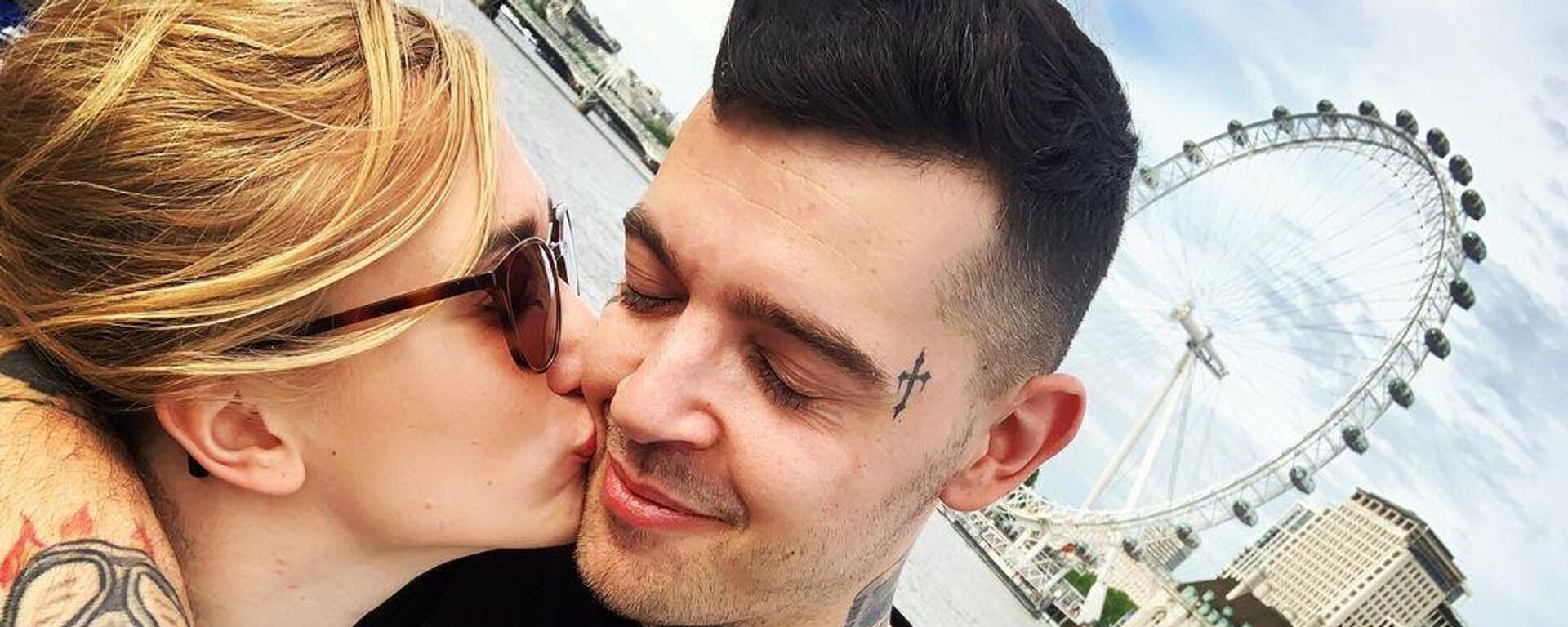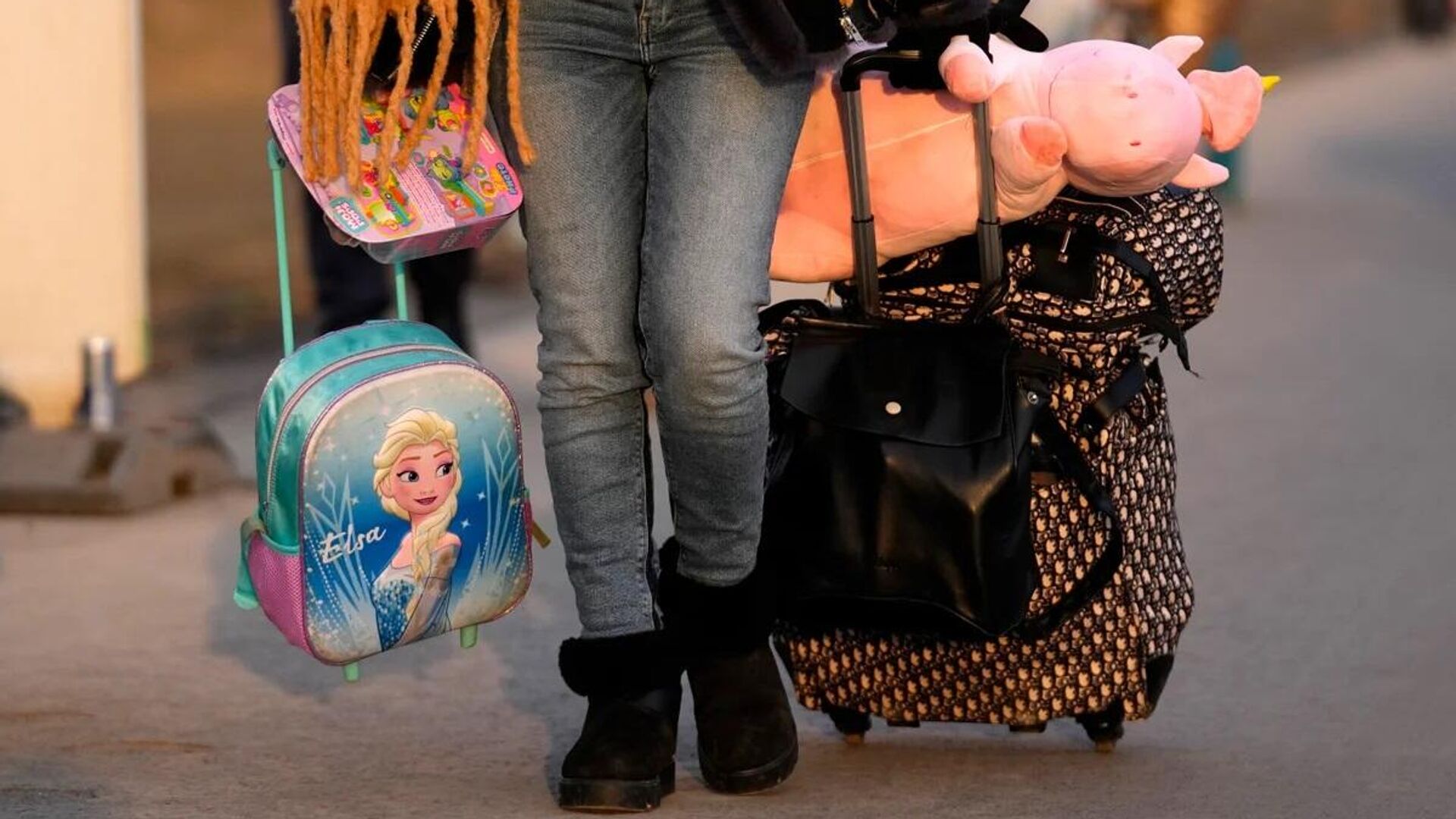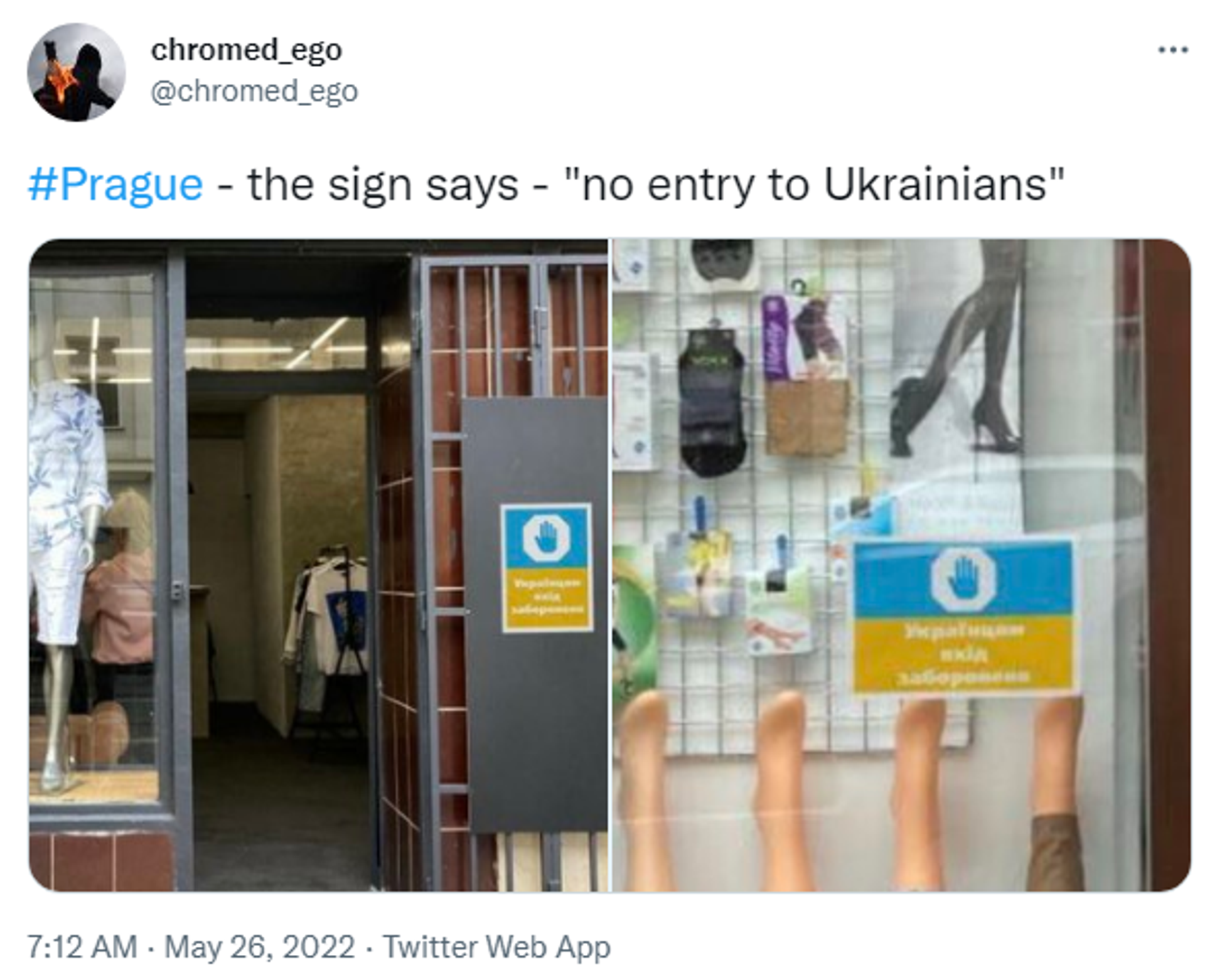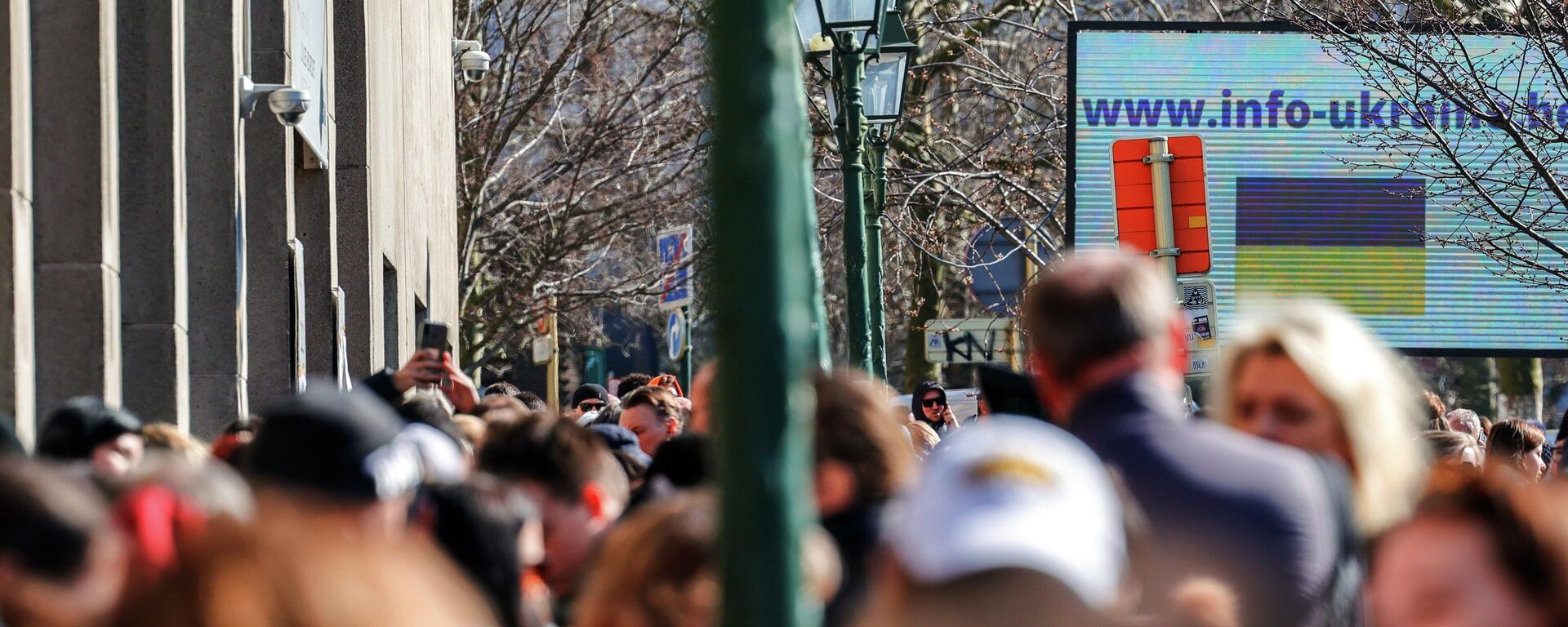https://sputnikglobe.com/20221031/end-of-the-lvov-affair-europe-tires-of-ukrainian-refugees--1102865634.html
End of the Lvov Affair: Europe Tires of Ukrainian Refugees
End of the Lvov Affair: Europe Tires of Ukrainian Refugees
Sputnik International
European Union and NATO countries have taken in millions of Ukrainian refugees since the start of the Russian military operation there in February. But recent... 31.10.2022, Sputnik International
2022-10-31T16:53+0000
2022-10-31T16:53+0000
2023-06-20T17:10+0000
world
ukraine
europe
migrants
refugees
belgium
germany
ireland
united kingdom (uk)
czech republic
https://cdn1.img.sputnikglobe.com/img/07e6/05/1f/1095899689_0:91:1200:766_1920x0_80_0_0_0ff19b12b4d79b1e484fb20c96cc879c.jpg
Europeans are increasingly tiring of their Ukrainian refugee guests — many in their own homes — as the conflict enters its ninth month.Now Ukrainian President Volodymyr Zelensky's government has told them not to come back soon, for fear of overloading the electrical network crippled by Russian missile and drone strikes.Nearly eight million Ukrainians have fled the country since February 24, most of them to European Union (EU) and NATO member states that support the Kiev regime's attacks on the people of the eastern Donbass region, which recently voted to join the Russian Federation.But why is "the Europe of solidarity" turning its back on the nation that leaders wanted to welcome into its economic and military blocs?GermanyGerman media reported over the weekend that some local authorities were being left to cope with the influx unaided.The small eastern town of Cottbus, near the Polish border, has taken in around 1,500 of the roughly one million Ukrainian refugees in Germany. Some 500 of those are children for whom places must be found in local schools.Germany allocates incoming refugees to its 16 federal states based on their populations and tax revenues as an indicator of wealth. Wealthy North Rhine-Westphalia in the west of Germany has a quota of 21 percent, compared to three percent for Brandenburg, where Cottbus is found.But the town council has complained that the federal government 90 miles away in Berlin had failed to keep its promises of financial aid.Earlier in October, Cottbus said it would accept no more arrivals until a more "equitable" settlement policy was put in place. Glossman said the town hall had heard "no official response" from either state or federal officials.Meanwhile, one online initiative to promote solidarity with the refugees has drawn criticism for portraying them collectively as a wild pig dubbed My Friend Mykola — playing to ethnic Ukrainian stereotypes.United KingdomThe British government has been one of the most enthusiastic for sanctions on Russia and arms to Ukraine, which have backfired on Western nations' economies.It also encouraged citizens to take Ukrainian refugees into their home, offering them £350 a month to care for an individual or family — far less than they could get by renting a spare room to a lodger, and increasingly worthless thanks to 10 percent inflation and multiplying energy prises caused by the sanctions. At the same time, the state is accommodating people trafficked by sea who then claim political asylum in hotels around the country.Unsurprisingly, less than a quarter of Brits and just two out of the 650 MPs in Parliament were willing to take in a Ukrainian. British media reported that around 100,000 refugees welcomed into private homes are coming to the end of their six-month tenures with nowhere else to go.While repeating Kiev's claims against Russia uncritically, the British mainstream media could not resist reporting on the antics of some ungrateful guests from the east.The most infamous was 22-year-old Sofiia Karkadym, who began a relationship with 30-year-old Yorkshireman Tony Garnett just days after she moved into his family home.Garnett left his wife and two young daughters to move into a flat in Bradford with Karkadym, but their relationship soon turned toxic. Tony called the police on his birthday in September after Sofiia drank heavily and began rowing with him, stabbing the wall threateningly with a kitchen knife.The blonde homewrecker complained to reporters she was left homeless and friendless in "disgusting" temporary accommodation police found for her in the West Yorkshire city.That soap opera was not an isolated incident, however. In the leafy south-eastern county of Surrey, 52-year-old dotcom millionaire Haakon Overli, founder of payday loan website Wonga.com, left his wife and kids for 39-year-old Mariia Polonchuk.The furtive lovers were photographed with Overli's family and local MP Jeremy Hunt — now imposing Ukraine conflict-driven austerity measures as chancellor of the exchequer — at a local village fete.But perhaps most outrageous was the Ukrainian woman who reported her British host family to the police for modern-day slavery after they asked her to help with the washing-up.Mental health specialist Hannah Debenham from Uckfield in East Sussex had to endure an hours-long interrogation at the local police station after the unnamed refugee woman in her 30s made the complaint, while her husband was grilled at their home.To add insult to injury, the family had agreed to pay the woman £200 a week to babysit for them two or three times per week. But when their five-year-old son needed the toilet on a visit to a nearby school, she told him to poo in a field next to the playground and wipe his bottom with leaves."Our house was just two minutes away, and why could she not ask someone at the school if he could use the toilet?" the outraged mum asked. She said the Ukrainian simply replied that she wouldn't have told Debenham if she knew she would react that way.Czech RepublicThe Czech capital Prague has seen huge demonstrations against the sanctions on Russia that have sent household bills soaring. But as early as May this year there were signs — literally — of hostility towards Ukraine.Shops began displaying notices reading: "No entry to Ukrainians" in the spring, following a string of alleged thefts and anti-social behaviour in the city.Landlords also reportedly refused to rent to Ukrainians after incidents where they graffitied swastikas in apartments and trashed the rooms.Refugees of the Roma ethnic minority — now openly persecuted with impunity by neo-Nazi groups in Ukraine — also found cold comfort in the Czech Republic and neighbouring Germany.More than 500 were forced to live for weeks in a shelter at Prague's central railway station meant to house just 250 overnight. Others who tried to move on to Germany were prevented from getting off their train by police at Dresden station and sent back.Other East European countries are also unhappy with the influx. Poland, which has accepted well over a million refugees from its eastern neighbour, has received just €144 million in aid from the European Union in return. Warsaw has demanded billions in compensation from Brussels.Bulgaria to the south had taken in nearly 300,000 Ukrainians by the early summer, putting them up in resorts along its popular Black Sea coast. But in May, the government said they would have to move on to make way for paying tourists.BelgiumAndre Maton, a social worker in the Belgian city of Charleroi, told Sputnik that families there were "exhausted" from the strain of looking after refugee families.The government pays benefits of €1,300 a month to each adult Ukrainian refugee, plus €300 for each of their children. They are offered a standard agreement to sign saying they will pay 20 percent of that to their host family — but that has stirred resentment.Some families who agreed to host a mother and two children found themselves looking after three adults, the social worker said. Meanwhile inflation was outstripping the meagre compensation they received, while the language barrier prevented refugees from finding work to support themselves.IrelandAn internal government memo leaked in May expressed fears that the influx of refugees would threaten "social cohesion" in the republic of five million inhabitants, which was already suffering from an acute housing shortage before the conflict.It reportedly raised concerns about the impact on public services, transport, travel, and the Irish tourism industry.Government projections were based on an assumption of 250 arrivals per day, while the true figure was an average 335 per day by late May.Irish media called the document the “first evidence of concerns at the highest levels of government about the impact of this crisis on communities across the country.”
https://sputnikglobe.com/20220928/no-home-no-money-ukrainian-refugee-who-seduced-her-host-in-uk-got-dumped-and-arrested-1101308739.html
https://sputnikglobe.com/20220607/belgian-families-hosting-ukrainian-refugees-complain-of-exhaustion-social-worker-says-1096094438.html
ukraine
belgium
germany
ireland
united kingdom (uk)
czech republic
Sputnik International
feedback@sputniknews.com
+74956456601
MIA „Rossiya Segodnya“
2022
James Tweedie
https://cdn1.img.sputnikglobe.com/img/07e4/08/1c/1080307270_0:3:397:400_100x100_80_0_0_7777393b9b18802f2e3c5eaa9cbcc612.png
James Tweedie
https://cdn1.img.sputnikglobe.com/img/07e4/08/1c/1080307270_0:3:397:400_100x100_80_0_0_7777393b9b18802f2e3c5eaa9cbcc612.png
News
en_EN
Sputnik International
feedback@sputniknews.com
+74956456601
MIA „Rossiya Segodnya“
Sputnik International
feedback@sputniknews.com
+74956456601
MIA „Rossiya Segodnya“
James Tweedie
https://cdn1.img.sputnikglobe.com/img/07e4/08/1c/1080307270_0:3:397:400_100x100_80_0_0_7777393b9b18802f2e3c5eaa9cbcc612.png
ukraine, europe, migrants, refugees, belgium, germany, ireland, united kingdom (uk), czech republic
ukraine, europe, migrants, refugees, belgium, germany, ireland, united kingdom (uk), czech republic
End of the Lvov Affair: Europe Tires of Ukrainian Refugees
16:53 GMT 31.10.2022 (Updated: 17:10 GMT 20.06.2023) European Union and NATO countries have taken in millions of Ukrainian refugees since the start of the Russian military operation there in February. But recent reports suggest the guests have outstayed their welcome in countries unready to host so many.
Europeans are increasingly tiring of their Ukrainian refugee guests — many in their own homes — as the conflict enters its ninth month.
Now Ukrainian President Volodymyr Zelensky's government has told them not to come back soon, for fear of overloading the electrical network crippled by Russian missile and drone strikes.
Nearly eight million Ukrainians have fled the country since February 24, most of them to European Union (EU) and NATO member states that support the Kiev regime's attacks on the people of the eastern Donbass region, which recently voted to join the Russian Federation.
But why is "the Europe of solidarity" turning its back on the nation that leaders wanted to welcome into its economic and military blocs?
German media reported over the weekend that some local authorities were being left to cope with the influx unaided.
The small eastern town of Cottbus, near the Polish border, has taken in around 1,500 of the roughly one million Ukrainian refugees in Germany. Some 500 of those are children for whom places must be found in local schools.
"The feds reimburse us for the upfront asylum costs, but not the running costs," said Stefanie Kaygusuz-Schurmann, the town's education and integration chief.
Germany allocates incoming refugees to its 16 federal states based on their populations and tax revenues as an indicator of wealth. Wealthy North Rhine-Westphalia in the west of Germany has a quota of 21 percent, compared to three percent for Brandenburg, where Cottbus is found.
But the town council has complained that the federal government 90 miles away in Berlin had failed to keep its promises of financial aid.
"Rich Germany can do everything," mayoral spokesman Jan Glossmann said. "But that money is not spread around evenly."
Earlier in October, Cottbus said it would accept no more arrivals until a more "equitable" settlement policy was put in place. Glossman said the town hall had heard "no official response" from either state or federal officials.
Meanwhile, one online initiative to promote solidarity with the refugees has drawn criticism for portraying them collectively as a wild pig dubbed
My Friend Mykola — playing to ethnic Ukrainian stereotypes.
The British government has been one of the most enthusiastic for sanctions on Russia and arms to Ukraine, which have backfired on Western nations' economies.
It also encouraged citizens to take Ukrainian refugees into their home, offering them
£350 a month to care for an individual or family — far less than they could get by renting a spare room to a lodger, and increasingly worthless thanks to 10 percent inflation and multiplying energy prises caused by the sanctions.
At the same time, the state is accommodating people trafficked by sea who then claim political asylum in
hotels around the country.
Unsurprisingly,
less than a quarter of Brits and just two out of the 650 MPs in Parliament were willing to take in a Ukrainian. British media reported that around 100,000 refugees welcomed into private homes are coming to the end of their six-month tenures with nowhere else to go.
While repeating Kiev's claims against Russia uncritically, the British mainstream media could not resist reporting on the antics of some ungrateful guests from the east.
The most infamous was 22-year-old
Sofiia Karkadym, who began a relationship with 30-year-old Yorkshireman Tony Garnett just days after she moved into his family home.
Garnett left his wife and two young daughters to move into a flat in Bradford with Karkadym, but their relationship soon turned toxic. Tony called the police on his birthday in September after Sofiia drank heavily and began rowing with him, stabbing the wall threateningly with a kitchen knife.
The blonde homewrecker complained to reporters she was left homeless and friendless in "disgusting" temporary accommodation police found for her in the West Yorkshire city.

28 September 2022, 13:13 GMT
That soap opera was not an isolated incident, however. In the leafy south-eastern county of Surrey, 52-year-old dotcom millionaire Haakon Overli, founder of payday loan website Wonga.com, left his wife and kids for 39-year-old Mariia Polonchuk.
The furtive lovers were photographed with Overli's family and local MP Jeremy Hunt — now imposing Ukraine conflict-driven austerity measures as chancellor of the exchequer — at a local village fete.
But perhaps most outrageous was the Ukrainian woman who reported her British host family to the police for
modern-day slavery after they asked her to help with the washing-up.
Mental health specialist Hannah Debenham from Uckfield in East Sussex had to endure an hours-long interrogation at the local police station after the unnamed refugee woman in her 30s made the complaint, while her husband was grilled at their home.
"It was just devastating. We just wanted to help," Debenham said. "If I was charged I would have had to declare that and it would have been a permanent impediment to my career."
To add insult to injury, the family had agreed to pay the woman £200 a week to babysit for them two or three times per week. But when their five-year-old son needed the toilet on a visit to a nearby school, she told him to poo in a field next to the playground and wipe his bottom with leaves.
"Our house was just two minutes away, and why could she not ask someone at the school if he could use the toilet?" the outraged mum asked. She said the Ukrainian simply replied that she wouldn't have told Debenham if she knew she would react that way.
The Czech capital Prague has seen huge demonstrations against the sanctions on Russia that have sent household bills soaring. But as early as May this year there were signs — literally — of hostility towards Ukraine.
Shops began
displaying notices reading: "No entry to Ukrainians" in the spring, following a string of alleged thefts and anti-social behaviour in the city.
Landlords also reportedly refused to rent to Ukrainians after incidents where they graffitied swastikas in apartments and trashed the rooms.
Refugees of the Roma ethnic minority — now openly persecuted with impunity by neo-Nazi groups in Ukraine — also found cold comfort in the Czech Republic and neighbouring Germany.
More than 500 were forced to live for weeks in a shelter at Prague's central railway station meant to house just 250 overnight. Others who tried to move on to Germany were prevented from getting off their train by police at Dresden station and sent back.
Other East European countries are also unhappy with the influx. Poland, which has accepted well over a million refugees from its eastern neighbour, has received just €144 million in aid from the European Union in return. Warsaw has
demanded billions in compensation from Brussels.
Bulgaria to the south had taken in nearly 300,000 Ukrainians by the early summer, putting them up in resorts along its popular Black Sea coast. But in May, the government said they would have to
move on to make way for paying tourists.
Andre Maton, a social worker in the Belgian city of Charleroi, told Sputnik that families there were "exhausted" from the strain of looking after refugee families.
The government pays benefits of €1,300 a month to each adult Ukrainian refugee, plus €300 for each of their children. They are offered a standard agreement to sign saying they will pay 20 percent of that to their host family — but that has stirred resentment.
"It is often more than what the host family has to live on. And tensions arise when the refugees refuse to give up some of the money they receive for the costs they incur," Maton said. "Some hosting families consider it abnormal that refugees 'make savings on their backs.'"
Some families who agreed to host a mother and two children found themselves looking after three adults, the social worker said. Meanwhile inflation was outstripping the meagre compensation they received, while the language barrier prevented refugees from finding work to support themselves.
An internal
government memo leaked in May expressed fears that the influx of refugees would threaten "social cohesion" in the republic of five million inhabitants, which was already suffering from an acute housing shortage before the conflict.
It reportedly raised concerns about the impact on public services, transport, travel, and the Irish tourism industry.
Officials said supporting refugees would impact the “wider population,” highlighting “the unsustainability of that very model of humanitarian response, additional budgetary pressures, and increased demand for public services” — of which some already have “unmet demand.”
Government projections were based on an assumption of 250 arrivals per day, while the true figure was an average 335 per day by late May.
Irish media called the document the “first evidence of concerns at the highest levels of government about the impact of this crisis on communities across the country.”







